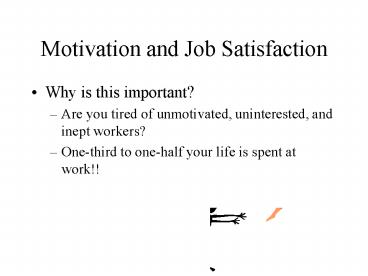Motivation and Job Satisfaction - PowerPoint PPT Presentation
1 / 15
Title:
Motivation and Job Satisfaction
Description:
Motivation and Job Satisfaction Why is this important? Are you tired of unmotivated, uninterested, and inept workers? One-third to one-half your life is spent at work!! – PowerPoint PPT presentation
Number of Views:439
Avg rating:3.0/5.0
Title: Motivation and Job Satisfaction
1
Motivation and Job Satisfaction
- Why is this important?
- Are you tired of unmotivated, uninterested, and
inept workers? - One-third to one-half your life is spent at work!!
2
Theories of Motivation
- Content Theories Focus on the importance of the
work (e.g., challenges and responsibilities) - Specific needs that motivate human behavior
- Process Theories Deal with the cognitive
processes used in making decisions about our work
3
Content Theories
- Achievement Motivation Theory David McClelland.
Emphasizes need to accomplish something. Linked
to successful managers - Favor environment where they can assume
responsibility - Take calculated risks and set attainable goals
- Need continuing recognition and feedback
- Managers high in achievement motivation show more
respect for subordinates and use more
participatory systems
4
Need Hierarchy Theory
- Abraham Maslow proposed that we have a hierarchy
of needs. Once one is fulfilled we can move on
to the next - Physiological
- Safety
- Belonging and Love
- Esteem
- Self-Actualization
5
ERG Theory
- Alderfer
- Similar to Maslow. We have needs, but in this
case they are not hierarchically arranged - Satisfying a need may increase its strength
- Existence Needs
- Relatedness Needs
- Growth Needs
6
Motivator-Hygiene (Two Factor) Theory
- Motivator Needs internal to work itself. If
conditions are met, job satisfaction occurs - Job enrichment expand a job to give employee a
greater role in planning, performing, and
evaluating their work - Hygiene Needs Features of work environment. If
not met, job dissatisfaction occurs
7
Job Characteristics Theory
- If employees have a high need for growth,
specific job characteristics lead to
psychological conditions that lead to increased
motivation, performance, and satisfaction. - Skill variety
- Unity of a job
- Task significance
- Autonomy
- Feedback
8
Process Theories
- Valence-Instrumentality-Expectancy (VIE) Theory
people will work hard if they expect their effort
to lead to reward - Importance of outcome determines its strength as
a motivator supported by research
9
Equity Theory
- Motivation is influenced by how fairly we feel we
are treated at work - Benevolent Workers martyrs. Feel guilt when
rewarded - Equity Workers Sensitive to fairness. Normal
- Entitled Workers
10
Goal-Setting Theory
- Idea that our primary motivation on the job is
defined in terms of our desire to achieve a
particular goal - Research shows that having goals leads to better
performance than not having goals - Specific goals are more motivating than general
- Moderately difficult goals are most motivating
11
High Performance Cycle
- Expands on Goal Setting Theory
- Specific, attainable goals influenced by
- Moderators (commitment to goal, self-efficacy,
task difficulty, feedback) and - Mediating Mechanisms (universal task strategies
such as direction of attention, effort and
persistence)
12
Job Satisfaction
- Overall measures of satisfaction may be too
broad current measures address different facets
of job satisfaction - Overall job satisfaction rate has remained the
same for over 50 years - Rates are much lower for government workers
- When people say they are satisfied, they often
mean they are not dissatisfied!!
13
Personal Characteristics and Job Satisfaction
- Age in general, increases with age
- Malcontents have stopped working
- Older workers have greater chance of fulfillment
- Gender inconclusive results
- Race whites are happier
- Cognitive Ability slight negative relationship
between level of education and satisfaction
14
Personal Characteristics, Cont.
- Use of Skills
- Job Congruence
- Personality less alienation and internal locus
of control lead to higher satisfaction - Occupational Level the higher the status level
the greater the satisfaction
15
Low Satisfaction and Job Behavior
- Absenteeism any given day 16-20 of workers miss
work. Costs businesses 30 billion dollars a
year - Younger have higher absence rates
- Rates are influenced by economic conditions
- Turnover Not always a bad thing!
- Functional Turnover when bad workers leave
- Dysfunctional Turnover































